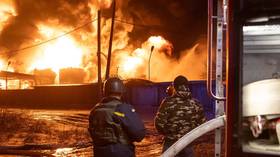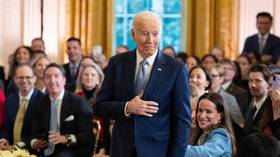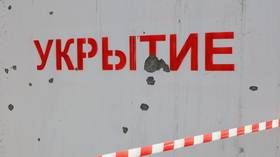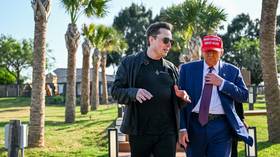Liquor stores & gun shops open for business, but churches closed. Why are US governors trashing the First Amendment?
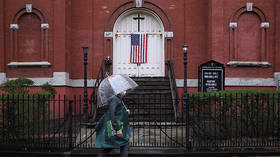
At a time when Americans could use some spiritual support to see them through the coronavirus pandemic, states have banned worshipers from assembling under a single roof. How quickly US politicians forget about the Constitution.
Let’s start by stating the obvious: Yes, there are potential risks involved in allowing people to assemble in churches, mosques and synagogues at a time when a viral pandemic is sweeping the planet. And yes, nobody wants to be responsible for spreading a deadly disease. That said, it seems that downgrading church attendance to ‘non-essential’ status, while many businesses remain open, is not only over-the-top and hypocritical, but also a slap in the face to believers.
Also on rt.com A cure worse than the disease: UK lockdown could cause 150,000 ‘avoidable’ deaths, MORE than the virus it’s meant to stopJust last week, a group of pastors, prohibited from congregating for Easter, the holiest day of the year for Christians, filed charges against California Governor Gavin Newsom for “criminalizing” church gatherings. Lawyers for the group argued that if the residents of America’s most populous state are permitted to shop at “Costco or the local marijuana shop or liquor store,” then the same rule should apply to houses of worship as well. It would be very difficult to argue with that line of reasoning. Shouldn’t churchgoers be trusted to follow the social distancing guidelines just like everyone else? After all, just because they might believe in an afterlife, it doesn’t necessarily mean they are in a hurry to get there.
Real question: Why can restaurant employees bring food to my car window but pastors not bring communion to my car window?
— Joy Pullmann (@JoyPullmann) April 16, 2020
On the other side of the country, New Jersey Governor Phil Murphy said in an interview with Tucker Carlson that “I wasn’t thinking of the Bill of Rights when we [ordered the shutdown of churches] … People have to stay away from each other.” Then, in a rather pathetic effort to distance himself from the unpopular crackdown, Murphy said that decisions on such issues were “above my pay grade.” This begs the question: whatever happened to the rule that calls for the “separation of church and state?” Or is that only relevant when it comes to the church attempting to infringe upon the government, and not the other way around?
Whatever the case may be, America is beginning to resemble, if not an outright police state, then certainly a snitch state – particularly for those citizens who want to practice their faith during this time of crisis. In all but a handful of US states, worshipers are forced to ‘attend’ religious services online, or perhaps from the comfort of their automobiles in the church parking lot. Planning a wedding? The Centers for Disease Control and Prevention (CDC) has advised delaying nuptials at least until mid-May. How about a funeral? Even the crucial act of bidding farewell to the dearly departed has practically become an act of civil disobedience. Earlier this month, 15 members of a New Jersey synagogue were charged with violating the state’s ban on large gatherings during a funeral service.
This crackdown on religious assembly is all the more difficult to fathom when one remembers that freedom of religion is inscribed in the First Amendment of the Bill of Rights, where it unambiguously states: “Congress shall make no law respecting an establishment of religion, or prohibiting the free exercise thereof; or abridging the freedom of speech, or of the press; or the right of the people peaceably to assemble, and to petition the Government for a redress of grievances.”
Incredibly, even when it came to the question of gun shops, the government was quick to intervene on behalf of the Second Amendment (not to mention the powerful gun lobbies), declaring that such businesses were “essential” and should be allowed to remain open during the pandemic. The same thing applies to liquor stores, although a person would be hard-pressed to find any mention of those establishments in the US Constitution.
Also on rt.com American clinics report up to 400% rise in abortion requests. If there's a Covid-19 economic collapse, this will get much worseSo here we have a rather paradoxical situation, where politicians are supporting the idea of people loading up on firearms and booze at a time of high unemployment, social isolation and a deep uncertainty over the future. At the same time, they have a problem with folks seeking spiritual guidance at houses of worship in these times of trouble. Something doesn’t quite add up, and many other people are starting to see it that way as well.
In Kansas, for example, the question of church attendance exploded into a partisan firestorm as the Republican-led legislature, citing the state constitution, overturned Democratic Governor Laura Kelly’s executive order restricting the size of religious gatherings to just 10 people. Kansas health officials said they felt the need to act after it was determined that three people out of 165 infected Kansas residents contracted the coronavirus at religious events.
Last week, the Trump administration issued its first statement with regards to how states were handling religious gatherings. It was in response to a church in Mississippi which reportedly held parking lot worship services. This allowed congregants to listen to the sermon over their car radios, while sitting in their vehicles in the church parking lot with the windows rolled up. Despite these precautionary measures, the attendees were fined $500 per person – yet at the same time people were permitted to attend nearby drive-in restaurants, even with their car windows open. Clearly a case of double standards in favor of tax-paying businesses.
Attorney General William Barr reminded in his statement that “even in times of emergency … the First Amendment and federal statutory law prohibit discrimination against religious institutions and religious believers.” Then, by way of example, he underlined that if a state government “allows movie theaters, restaurants, concert halls, and other comparable places of assembly to remain open and unrestricted, it may not order houses of worship to close, limit their congregation size, or otherwise impede religious gatherings.”
Now it remains to be seen if the states will abide by Barr’s recommendation, supported as it is by the law of the land, or whether they will challenge the Trump administration, arguing that their actions are designed to protect the health of the public.
Until a solution to the ongoing religious standoff is found, which just might be at the level of the Supreme Court, many Americans will be forced to observe their faith from the privacy of their own homes – even as “essential” businesses continue serving their customers. If anything, this is the perfect way to make a difficult situation absolutely intolerable.
If you like this story, share it with a friend!
The statements, views and opinions expressed in this column are solely those of the author and do not necessarily represent those of RT.



